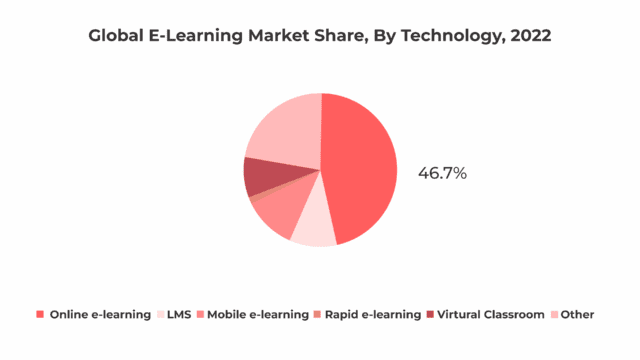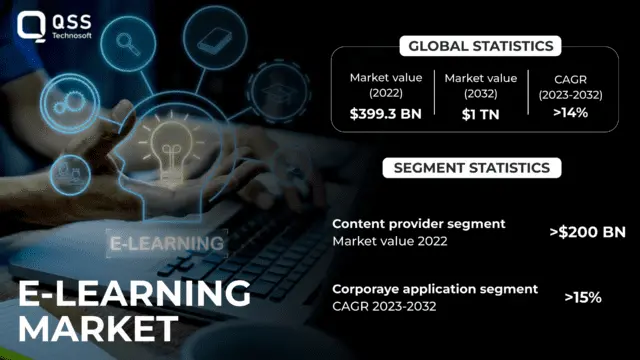E-learning, or electronic learning, is quickly becoming vital to the way educational systems are shaped, and on a global scale have become an unavoidable phenomenon. In comparison to more conventional methods, it offers learners rewardingly innovative freedoms, suiting learners of all ages, anywhere in the world, with the full access to education, at any time, and at your own, decided pace.
Though, not all opportunities amongst this enhancing age of tech, can offer every person a personalised approach to learning that fully meets laid out needs and expectations, alike. As a result, tailored e-learning platforms have surged in demand with the help of developers such as angularjs developers for hire .
By customising the internal set up of the tools against outlined criteria, you have access to all kinds of added features and a wide range of functionalities. This provides the personalisation required to give learners a truly enhanced educational experience.
The Need for Custom E-Learning Platforms
Off-the-shelf e-learning platforms certainly have a place in the world of online learning, however, more and more often they leave educators, institutions, and learners with an unfulfilled offering. In today’s modern age of e-learning, just one size does not fit all. That’s why custom e-learning platforms are becoming more and more crucial. There are a few primary reasons to consider the value of a custom-built platform:
Tailored Content and Curriculum
Educators often find that pre-built e-learning platforms don’t offer the pedagogical approaches and teaching materials that they need. Such a platform gives them freedom to develop materials and hire flutter developers that connect directly with the needs and expectations of their class. It gives them the flexible framework they need to create remarkably engaging lessons tailored to their students.
Personalization and Engagement
Custom e-learning platforms provide an enriched learning experience by leveraging data analytics and user insights. This gives learners the opportunity to access personalised recommendations, adaptive content and engaging interactive features. These benefits can help keep users engaged and motivated throughout their learning journey. By creating a truly unique educational environment, custom e-learning platforms are setting the bar for modern learning experiences.
Scalability
Institutions and organisations often require e-learning platforms that can scale with their growing needs. Custom solutions can be designed to accommodate increased user bases, courses, and content, ensuring that the platform remains effective as it expands.
Control and Security
Custom e-learning platforms offer an unprecedented level of control over data protection and access, making them critical for any institution dealing with sensitive information. Adherence to data protection regulations can be a tedious process, and having a reliable system in place that allows for secure information storage and preventative measures can give administrators peace of mind. This added protection can easily eliminate potential digital threats that would otherwise capture personal or confidential information.
Integration
Institutions in the education sector frequently need to integrate with different operating frameworks, Learning Management Systems (LMS), content libraries, and assessment tools. Modernised custom e-learning platforms allow seamless integration of these diverse components. However, incorporating robust and comprehensive features isn’t enough. Harnessing the synergistic forces of user engagement should deliver an experience worthy of recognition.
The Technology Behind Custom E-Learning Platforms

Developing a custom e-learning platform is a complex process that involves several key technologies and considerations:
Content Management System (CMS)
An efficient Content Management System (CMS) makes it easier for e-learning platforms to complement their Allegiance. With a customizable CMS, administrators and educators have the flexibility to create, edit, and arrange educational content to match the specific needs of their e-learning platform.
A tailored CMS solution gives an added advantage to the administrators of an e-learning platform. From arranging the content to efficient storage and swift management across different mediums, a tailored CMS is ideal to keep track and share content from teachers to students seamlessly.
Learning Analytics
Learning analytics are essential components of custom e-learning platforms. From these systems, data is collected that offers insight into student engagement, performance, and behaviour. By understanding these metrics, we gain a clearer picture of what teaching approaches help students the most and can improve the learning experience. Analysing this data can assist professionals, such as administrators and educators, in determining the best gear to make that can result in improved overall performance.
User Interface (UI) and User Experience (UX) Design
Creating the right user interface is key when it comes to creating a successful e-learning platform. To do this, custom platforms should be designed from a User-Centric perspective. This will guarantee that the interface is optimised for user understanding, looks true to the brand, and allows users to streamline their learning and jointly achieve the organisation’s goals.
Gamification and Interactivity
Custom e-learning platforms often incorporate gamification elements to enhance engagement. Gamified features, such as badges, leaderboards, and interactive quizzes, can motivate learners and make the learning experience more enjoyable.
Mobile Compatibility
Developing a custom e-learning platform with the help of hire mobile developers that is responsive and optimised for all device sizes and formats can help address this need. Adapting the design with advanced concepts like ‘responsive design’ can solve issues experienced by learners when accessing these platforms on their smartphones or tablets. This makes sure that there is equal access to the content irrespective of the device being used by the learner.
Statistics on the Impact of Custom E-Learning Platforms

To better understand the impact and benefits of custom e-learning platforms, let’s take a closer look at some statistics and case studies:
Improved Learning Outcomes
The Bill & Melinda Gates Foundation recently conducted a study that examined the impact of personalised learning and custom e-learning platforms on student outcomes. Astonishingly, it uncovered that these engaging platforms had a stimulative effect on their young users, boosting morale via a boost in engagement and improved performance. 93% of teachers surveyed reported better engagement levels, and of those 89% noticed improved student achievement with those e-learning platforms.
High Employee Engagement
Custom e-learning platforms have made a massive leap from their traditional use in education to being used more widely in corporate training. A report by IBM has found that organisations that have taken the opportunity to invest in tailored e-learning platforms have observed an 18% increase in employee engagement. This observed effect indicates that the use of these customised solutions has the potential to be extremely beneficial for companies that are looking to optimise the educational activities taking place at their workplace.
Adaptive Learning
Custom e-learning platforms often incorporate adaptive learning, which tailors’ content to individual students’ needs. A report by Ambient Insight Research predicts that the adaptive learning market will reach $4.05 billion by 2021.
Cost Savings
While the initial development of custom e-learning platforms can be an investment, they often lead to cost savings in the long run. A case study by Adobe found that companies that used e-learning tools saved between 50% and 70% compared to traditional instructor-led training.
Higher Retention Rates
Personalised learning experiences delivered through custom e-learning platforms have been linked to higher retention rates. A report by Docebo found that e-learning retention rates can be 25% to 60% higher than traditional classroom training.
The top eLearning statistics in 2023
- The eLearning industry has grown by 900% since 2000
- Corporate eLearning is expected to grow by 250% by 2026
- 75% of schools in the US plan to operate completely online
- Students retain 25%-60% more through online courses
- Corporate eLearning is 40%-60% less time-consuming that traditional learning
- 98% of US corporations planned on using eLearning
- 40% of Fortune 500 companies use eLearning
- eLearning is estimated to be worth $325 billion by 2025
- eLearning reduces energy consumption by 90%
Data Analytics in Custom E-Learning Platforms
Data analytics play a pivotal role in custom e-learning platforms, enabling educators and administrators to make data-driven decisions and continuously enhance the learning experience. Here are some key aspects of data analytics in this context:
Learning Analytics
Learning analytics involve collecting and analysing data on student behaviour, engagement, and performance. These insights can be used to identify at-risk students, improve course materials, and refine teaching strategies.
Personalized Learning Paths
Data analytics can be used to create personalised learning paths for individual students. By analysing a student’s progress and preferences, the platform can recommend specific courses, modules, or resources to optimise their learning journey.
Predictive Analytics
Predictive analytics can help educators identify students who may be struggling or at risk of dropping out. By analysing historical data, the platform can provide early warnings, allowing instructors to intervene and provide additional support.
Content Optimization
Data analytics can reveal which learning materials are the most effective and engaging. This information can guide educators in optimising existing content and developing new, more engaging resources.
Feedback and Assessment
Custom e-learning platforms often incorporate features for collecting student feedback and conducting assessments. Data analytics help in analysing this feedback to improve the quality of instruction and course content.
Case Study: Khan Academy
Khan Academy is an impressive example of a customised e-learning platform. By employing data analytics, it offers its users a highly personalised learning experience. By utilising data analytics and better understanding their users, the platform permits powerful personalisation features that dramatically improve engagement and learning for students. From sophisticated data visualisation to gamification features, Khan Academy has provided countless users with an extremely well-tailored educational experience.
Khan Academy’s custom e-learning platform utilises data analytics to track student progress and adapt content to their needs. Here are some key statistics and insights:
- Khan Academy has over 120 million registered users.
- 50 million students use Khan Academy every month.
- The platform offers content in more than 40 languages.
- Students have completed over 2 billion exercises on the platform.
Khan Academy’s use of data analytics allows it to offer personalised recommendations, track student performance, and continually refine its content to provide the best possible learning experience. This level of customization and adaptability is what makes Khan Academy an exemplary case of a custom e-learning platform.
The Future of Custom E-Learning Platforms
Management
As technology continues to progress, the need for specified e-learning solutions is becoming more and more pressing. With this increase in demand, an exciting future awaits the growth of tailored virtual educational platforms. Let’s examine some of the developments we should lookout for in the upcoming months.
Virtual Reality (VR) and Augmented Reality (AR)
Virtual Reality (VR) and Augmented Reality (AR) are slowly being integrated into e-learning platforms, allowing learners of all ages to have an immersive and interactive learning experience. In combination, this can come together to form more engaging learning environments that create corresponding memes to capture the essence of an educational content.
AI-Driven Chatbots
AI-driven chatbots will play a more significant role in providing instant support and guidance to learners. These virtual assistants can answer questions, offer explanations, and even provide personalised tutoring.
Blockchain for Credentials
Blockchain technology can be used to secure and verify educational credentials, making it easier for employers and institutions to validate a learner’s achievements. Custom platforms can incorporate blockchain-based credentialing systems.
Microlearning
Its convenience and relative speed of access provide significant benefits for learners. New custom e-learning platforms are nothing short of revolutionary when it comes to embracing and driving this trend forward. Learners can access information quickly and conveniently with the confidence that accuracy and relevance is never compromised – helping individuals become increasingly confident in identifying their own unique path to success.
Accessibility and Inclusivity
The emphasis on accessibility and inclusivity is expected to grow. Custom e-learning platforms will need to prioritise features that cater to learners with diverse needs and abilities.

Conclusion
Education is taking an exciting step into the future with the help of customised e-learning platforms. These platforms create tailored solutions to optimise learners’ experiences and to provide educators and institutions the ability to make engaging and effective learning environments. Even better, they make use of data analytics to continuously monitor learners progress and make improvements to their platform for the ultimate educational experience.
As technology advances, these e-learning platforms can blossom with new, innovative features that allow even more personalised options and more specific opportunities for customization. Combined, these developments and hire flutter app developer are revolutionising how we learn and train in unprecedented ways.
Why should you consider QSS Technosoft Inc as your top pick for creating bespoke e-learning platforms?
At QSS Technosoft Inc., we understand the importance of tailored online learning for modern businesses. Our team of experienced experts specialise in the most recent technologies, such as Artificial Intelligence (AI), Machine Learning, and Virtual Reality (VR). This way, we can provide our clients with innovative solutions for creating unrivalled digital learning experiences.
We are passionate about offering top tier quality and services, as we consistently strive to improve cost efficiency as well as deliver everything within proposed timelines. By integrating our knowledge and constant efficient performance, teaching content and patience in all our work processes, we promise to be a reliable partner for every client today and years to come.
We are proud to mention that our work has been recognized by leading B2B reviews and research platforms like GoodFirms, Clutch, MirrorView, and many more.


Building Custom E-Learning Platforms: Tailored Solutions for Optimal Learning Experiences